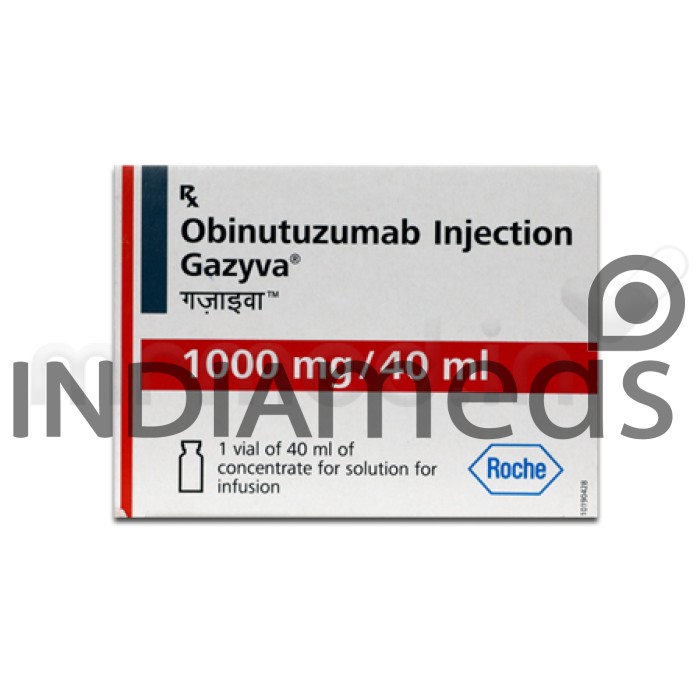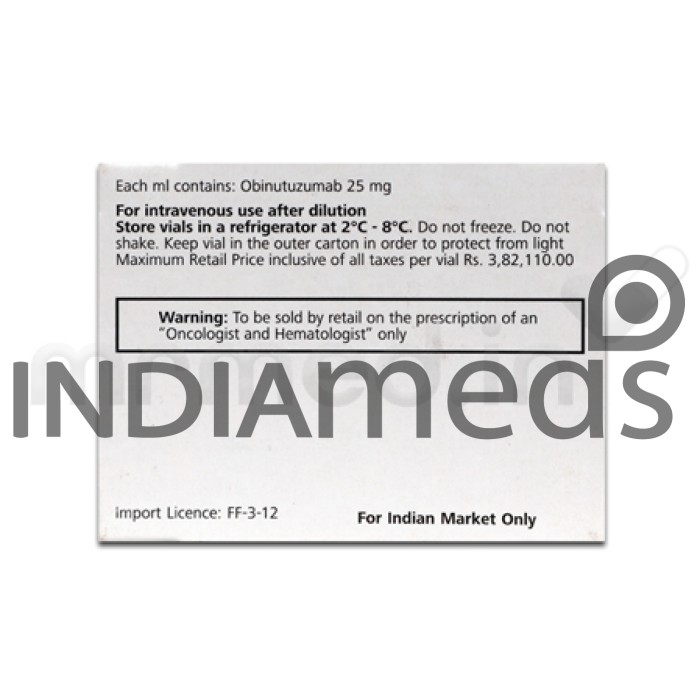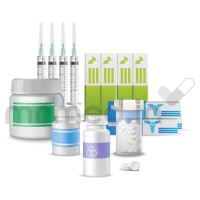Gazyva 1000mg injection contains the active substance Obinutuzumab. It is an antineoplastic drug that belongs to the class of medications called Anti-CD20 monoclonal antibodies. It is used in combination with other anticancer medicines to treat chronic lymphocytic leukemia (CLL) and non-Hodgkin's lymphoma (NHL) in adults. It works by killing and stopping cancer cells from growing.
Do not take this Gazyva 1000mg injection if you are allergic to obinutuzumab or any other ingredients of this medicine. Inform your physician if you have an active infection, or suffered from any infections, weak immune system, have or had heart problems, brain disorders, eye disorders, breathing problems, and liver diseases. Report to your physician if you face any symptoms of sudden difficulty in breathing, dizziness, diarrhea, cough, skin rash, chest pain, or fever after the administration of the injection.
Inform your physician if you face any symptoms of memory loss, trouble speaking, difficulty walking, or problems with your eyesight during the treatment with Gazyva 1000mg injection because these may indicate rare and life-threatening side effects. This medicine is not recommended for children and young people under 18 years of age. Use an effective method of contraception while being treated with this injection. Avoid pregnancy and breastfeeding during the treatment.
Therapeutic Effects of Gazyva 1000mg Injection
Pregnancy
Gazyva 1000mg injection is unsafe to administer in pregnant women because it may affect the fetus. Inform your physician if you are pregnant, suspect pregnancy, or planning to become pregnant. Using an effective birth control method during the treatment and for 18 months after your last dose is necessary.
Breast Feeding
Breastfeeding is not recommended in patients taking Gazyva 1000mg injection because the medicine passes into the breast milk in small amounts and may harm your baby.
Lungs
It is unknown whether Gazyva 1000mg injection can be used in patients with lung disorders. Consult your doctor if you have any lung diseases before starting the treatment.
Liver
Gazyva 1000mg injection is safe to use in patients with liver diseases. No dose adjustments are necessary. Inform your physician if you have any liver problems before initiating the therapy.
Alcohol
It is unknown whether consuming alcohol is safe during the treatment with Gazyva 1000mg injection. Inform your doctor if you are a chronic drinker.
Driving
Gazyva 1000mg injection does not affect the ability to drive. If you feel tired or dizzy after taking this medicine or if you get any infusion-related side effects, do not drive and consult your doctor for more advice.
Common
- Hair fall
- Constipation, diarrhea
- Anemia
- Decreased WBC and platelets
- Infection
- Muscle pain
- Headache, insomnia
- Urinary tract infections
- Cough
- Fever, tiredness
- Decreased appetite
Serious
- Bleeding in the stomach
- Anemia
- Hypersensitivity reactions
- Brain problems
- Severe infections
Allergic reactions like itching, swelling in your face or hands, tingling in mouth or throat, chest tightness, difficulty in breathing, fever, chills, cough, sore throat, body aches, unusual bleeding, bruising, or weakness should be informed to your doctor immediately.
Gazyva 1000mg injection is given as a cycle therapy. Your doctor will decide the dose and duration of the therapy based on your disease severity and condition.
Generally, Gazyva 1000mg injection is given as an infusion intravenously (into your vein). The infusion should be not given for more than 4 hours. Your doctor will decide the duration of the infusion based on your disease condition, and other factors.
The anti-CD20 monoclonal antibodies rituximab and Gazyva 1000mg injection differ in their mechanisms of action, with this injection evoking greater direct B cell death. Your doctor will decide the best therapy that works for you based on the condition and severity of the disease.
Gazyva 1000mg injection can cause infusion-related reactions like shortness of breath. If you face any symptoms inform your doctor immediately and seek medical advice.
Molecule name: Obinutuzumab | Therapeutic class: Antineoplastics |
Pharmacological class: Anti-CD20 monoclonal antibodies | Indications: 1. Chronic lymphocytic leukemia (CLL) 2. Non-Hodgkin’s lymphoma (NHL) |






